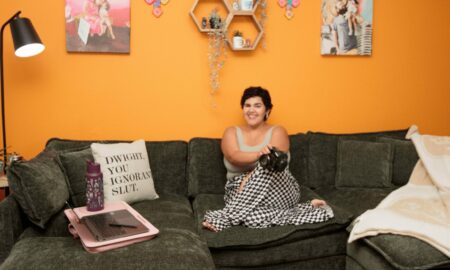

Today we’d like to introduce you to Beto Martinez
Hi Beto, please kick things off for us with an introduction to yourself and your story.
I grew up in Laredo, TX and lived there till I was 18. I don’t come from a musical family, but as a kid in the 80’s I grew up watching MTV and pretty early on became a music aficionado, buying cassettes, and living with my headphones on. I also began to daydream about playing the guitar like the rockers in the videos I saw. I was gifted my first guitar at 13 and after a few pointers from a cousin and another family friend, I was on my own and really just became obsessed with it. I met my friend Greg Gonzalez shortly after, he was learning to play bass and we hit it off. We started a band in high school and began to play parties and ultimately small clubs and bars in Laredo. By the time we graduated in 1995, we were convinced we needed to move to Austin to pursue a career in music. I moved to Austin in 1996 and ended up going to school at UT. In the meantime, I continued to play in my band mostly at parties, where we were crowd favorites but not able to break into the next level of our career. Finally, in 2000, just as I finished college, I co-founded a project that became Grupo Fantasma. GF quickly became a full time job with constant touring, first around the US, then the world. The hard work paid off and we received many accolades, from playing with musicians we admired like Prince, to Grammy Nominations and awards, the Austin Music Hall of Fame and appearances on Austin City Limits. In the meantime I started two other bands, Brownout and Money Chicha and settled into life as a full-time musician. In 2013, after living with my wife and daughters in S. Austin for 8 years, we sold our home and found a new one in Buda, where I was able to build my first recording Studio, Lechehouse Music. Over the last 8 years here, I’ve been able to work on not only my own projects, but with up and coming bands as a producer and engineer. Although the pandemic has put many things on hold, the studio has allowed me to keep working on music and my 3 bands are still active and plan to continue for the foreseeable future. I’m currently working on starting my own small record label where I can release and sell the music I record here.
Alright, so let’s dig a little deeper into the story – has it been an easy path overall and if not, what were the challenges you’ve had to overcome?
My parents always told me they didn’t want me to be a musician because it was a hard life. It took me a long time to understand what that meant, but I’ve come to understand it as I’ve gotten older. As a musician, you have no guarantees and you constantly have to sell yourself, to prove yourself. This business has many ups and downs and one of the most common mistakes you can make is to settle in and assume the up you’re in will last forever. I started playing music in Austin in the mid 90’s and it took 5 years before I had any real success to where I could even consider myself a professional. Of course, I was in my early 20’s then and was satisfied just making music and having fun. Success came fairly quick with Grupo Fantasma and we had over a decade of constant growth. Things finally leveled off in 2013 and I found myself in a position where work was slowing down, but I never really counted on that happening and wasn’t in a position to exploit other sources of income. I learned from that mistake and over the last 8 or 9 years, I’ve worked more on networking and diversifying my skill set. Of course, the pandemic has added a new set of challenges with the near total loss of live music. While a total shock at first, I’ve managed to lean on the studio more to get by and am exploring creative ways to us this space to continue working.
Thanks – so what else should our readers know about your work and what you’re currently focused on?
I’m a guitar player primarily and up until the pandemic began, that was a big part of my work, playing shows and touring. As the co-founder of the bands Grupo Fantasma, Brownout and Money Chicha, I also spend a lot of time dealing with the day to day business of those bands. For the past 8 years I’ve also run my own small recording studio, Lechehouse Music. I always envisioned the studio as an opportunity for me to work, essentially from home, when I wasn’t on the road. It has grown over the last few years and has steadily become more of a focus, more-so since the pandemic began. I record my own music here and that of my bands, but also other bands and musicians. My clientele is mostly people who know my work and often come from a Latin music background, though not exclusively. In the highly competitive and saturated world of Austin recording studios, I’ve never tried to compete with the larger and better equipped spots, instead I’ve tried to offer accessibility to up and coming bands and those that are familiar with the creative aesthetic I have cultivated over 20 years in Austin Music. As a pivot during the pandemic, I am expanding the role of the studio to record label. I have begun to manufacture and sell records that I record here with my first release set for February 12. I hope to continue to build that catalog in the future.
Alright so before we go can you talk to us a bit about how people can work with you, collaborate with you or support you?
2020 was a year of collaboration for me, as I reached out to and began to write and record with people outside of my usual circle of collaborators. I hope to continue that in 2021 and beyond. I am always open to creative collaborations as well as business partnerships to help grow the record label side of my business.
Contact Info:
- Email: lechehousemusic@gmail.com
- Website: www.lechehousemusic.com
- Instagram: https://www.instagram.com/lechehousemusic/?hl=en
- Facebook: https://www.facebook.com/LechehouseMusic
- Youtube: https://www.youtube.com/channel/UCflGiEYpaIViAK_2OhQ8-Tg
- Other: https://www.instagram.com/thelossundowns/?hl=en






 Image Credits
Image Credits
Sandra Dahdah










